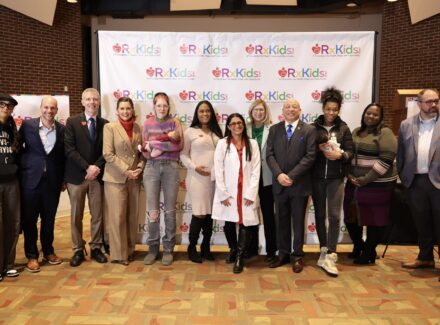
Katherine W. Bauer
Assistant Professor, School of Public Health
Poverty and health are closely intertwined. Families and individuals with low-incomes often experience barriers to affordable health care, healthy food, and other necessities. In turn, poor health can often lead to economic stress, including a loss of income, increased healthcare costs, and mental health challenges.
Health is also determined in part by access to social and economic opportunities. This includes resources and supports available in our homes, neighborhoods, and communities; access to quality education; workplace safety; clean water, food, and air; and social interactions and relationships.
The conditions in which we live often determine the degree of our health and well-being. Research shows that safe and affordable housing, access to education, public safety, availability of healthy foods, health services, and clean environments all play critical roles in the health and well-being of families and individuals. Systemic racism has historically denied people of color equitable access to healthy living conditions. On a personal level, racism contributes to chronic stress experienced by people of color, which can lead to adverse health outcomes.
Poverty Solutions and our affiliated scholars and partners work to reduce health disparities related to poverty and health equity. We support both small scale interventions and systems change projects to promote positive outcomes for both social and physical determinants of health and a higher quality-of-life.
By Heather Newberry and Sara Hughes
Journal of Urban Affairs
By Leonymae Aumentado
By Dana Kornberg, Mackenzie Taradalsky, Victoria Guster-Brown, Sylvia Orduño, and Diane Weckerle
By Trevor Bechtel, Mara C. Ostfeld, and H. Luke Shaefer
By Michele Heisler, Adrienne Lapidos, Edith Kieffer, James Henderson, Rebeca Guzman, Jasmina Cunmulaj, Jason Wolfe, Trish Meyer, and John Z. Ayanian
American Journal of Public Health
By Pinghui Wu and Michael Evangelist
Demography
By
Health Services Research
By Anton L. V. Avanceña, Ellen Kim DeLuca, Bradley Iott, Amanda Mauri, Nicholas Miller, Daniel Eisenberg, and David W. Hutton
American Journal of Public Health
By Analidis Ochoa, H. Luke Shaefer, and Andrew Grogan-Kaylor
The Journal of Sociology & Social Welfare
By Gregory Bushman and Roshanak Mehdipanah
Journal of Epidemiology and Community Health
By Analidis Ochoa, H. Luke Shaefer, and Andrew Grogan-Kaylor
By Cindy W Leung, Julia A Wolfson, Robert Hsu, Keith Soster, Steve Mangan, and Jennifer Falbe
The Journal of Nutrition
By Julia Wolfson and Cindy Leung
American Journal of Public Health
By Roshanak Mehdipanah
American Journal of Public Health
By Alexa Eisenberg, Eric Seymour, and Joshua Akers
Health & Place
By Julia Wolfson and Cindy Leung
Nutrients
By Monika Doshi, William D. Lopez, Hannah Mesa, Richard Bryce, Ellen Rabinowitz, Raymond Rion, and Paul Fleming
PLOS ONE
By H. Luke Shaefer, Kate Naranjo, and David Harris
Response from Cato Institute Senior Fellow Michael Tanner (Adobe PDF)
By Amy Bohnert, Jennifer Erb-Downward, and Thomas Ivacko
By Angela Bruns and Natasha Pilkauskas
Women’s Health Issues
By Jeremy Lapedis, Edith C. Kieffer, Carrie Rheingans, and Marianne Udow-Phillips
Poverty Solutions partners with Michigan State University-Hurley Children’s Hospital Pediatric Public Health Initiative, GiveDirectly, and the Greater Flint Health Coalition to improve infant and maternal health, the economic and mental well-being of participants, and community-wide outcomes in the City of Flint, MI.

The Conversation | Jul. 3, 2024
WEMU | May. 20, 2024

USA Today | Feb. 14, 2024